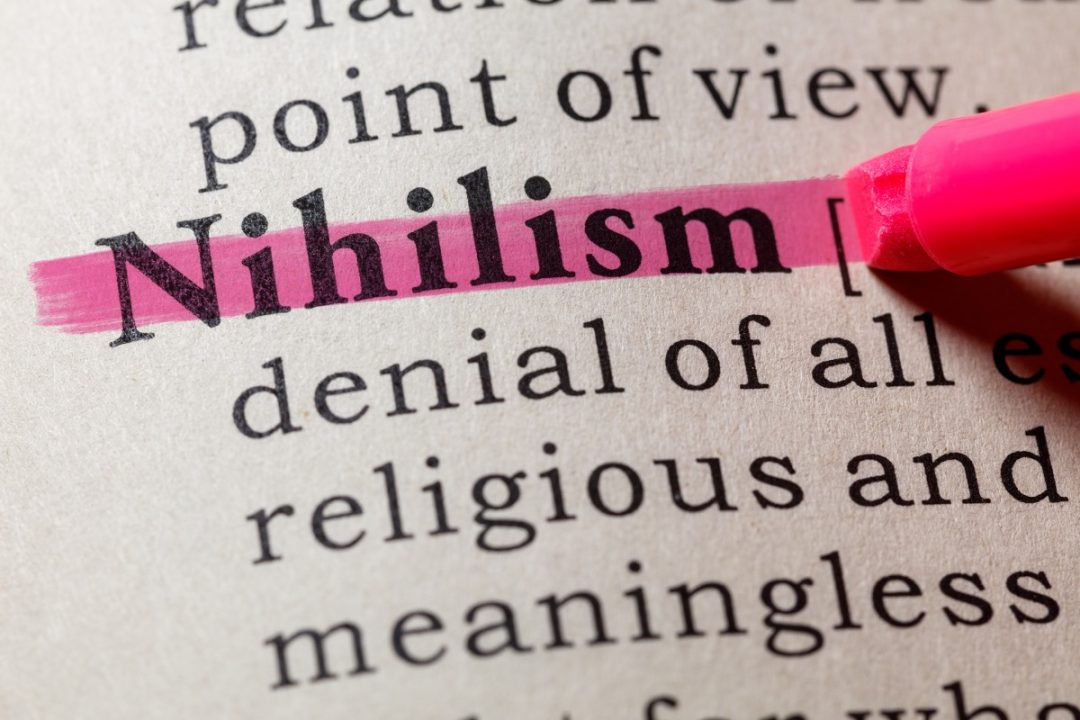
From the Charlie Kirk assassination to the Minneapolis Catholic Church shooting and beyond, Americans today are taken aback by how mindlessly violent society has become. Many, of course, seek to identify the causes, too, with the Democrats blaming guns and the Republicans mental illness. And both these claims do capture headlines. But what if the main cause is something so “non-sexy” — so, excuse my tongue, philosophical — that few care to even discuss it?
In the 19th century, very odd philosopher Friedrich Nietzsche famously proclaimed that “God is dead.” And though an atheist himself, he warned that this secularization “is already beginning to cast its first shadows over Europe.” Nietzsche, often wrong but no dummy, realized atheism could breed nihilism and that this, in turn, could create societal upheaval.
Fast-forward to 2025, and we hear that the FBI has a new criminal category: “Nihilistic Violent Extremist.” What’s more, some writers are finally picking up on the nihilism-violence connection. It’s about time, too.
And what is “nihilism”? Originating from the Latin nihil (“nothing”), it can be conceptualized as “nothing-ism.” It holds that life lacks inherent meaning, purpose, or value. It also tends to assert that traditional moral, religious, or societal frameworks are baseless. And most relevant here are existential nihilism, “Life has no purpose”; and moral nihilism, “There’s no morality” (objective by definition).
Oh, and this belief absolutely does correlate with atheism. More on that later.
A Virus in the Soul of America
Writing about this issue today is Deseret News’ Emma Pitts. Exemplifying the problem via the Charlie Kirk shooting, she writes that
there appears to be an all-consuming nihilistic force in American culture today, one that is being used to justify violence.
Pitts then cites the aforementioned Minneapolis shooting and the 1999 Columbine, Colorado, school massacre as nihilism-driven crimes. She states:
In both events, the shooters carried out their attacks and then turned their weapons on themselves, leaving behind either online posts or journal entries that described existence as pointless, society as irredeemable and morality as a sham.
She later adds that Kirk’s assassin, Tyler Robinson, was also involved in “online nihilistic culture.” And another event stands out in my mind.
Remember Stephen Paddock, the 64-year-old who murdered 60 people in the 2017 Las Vegas shooting before committing suicide? Authorities were befuddled at the time by what drove him, and they never did determine a motive. But I’ll paraphrase what my first thought was upon hearing this confusion.
Nihilism.
After all, Paddock was an unmarried, childless, elderly millionaire, and professed atheist, who was spending much of his life gambling. He apparently won quite a bit, but you don’t have to lose money to lose meaning. What if his meaningless existence was, at his advanced age, finally hitting home? (He reportedly was often depressed at the time.) What if, concluding that life is pointless and not believing in right and wrong, he decided to go out with not a whimper but a bang and make his dark mark on history?
You see, when people seek motives, they think of ideology and religion. They may wonder about Islamist, white supremacist, or anti-government motives. But finding life — your own and maybe others’ also — intolerable and wanting to end it is a motive, too.
Dark Logic
This all accords with how American violence has transitioned. It has “morphed,” states writer Peter Savodnik, “into a more amorphous nihilism detached from any clearly defined agenda or principle.” It also, do note, is something I’ve been warning about for decades.
This brings us, too, to why atheism — and moral relativism, mind you — correlates with moral nothing-ism. And a good way to illustrate it is with my old flavors analogy. To wit:
What is the origin of what we call “right and wrong”? There are only two possibilities: Either man determines it (social-construct theory), or something outside of man does. Let’s consider each thesis’ implications.
Regarding social-construct theory, imagine that 90 percent of humanity said it preferred chocolate over vanilla. This wouldn’t mean that chocolate was “right” and vanilla “wrong.” Nor would it mean that chocolate was better in any objective sense. It would simply mean that people happened to like chocolate better. But, question:
Would it be any more logical saying murder was wrong, if we say this for no other reason than the fact that 90 percent of humanity preferred others not kill in a way we call unjust?
So what can we say about the idea of murder’s wrongness being simply a function of man’s collective desires? It would then fall into the same category as the collective desires regarding flavor: that of taste — or preference.
Ergo, there is no morality.
Flailing and Failing
Nietzsche, do note, believed the nihilism-induced-meaningless problem could be tackled by creating the “Overman” (Übermensch). This is a type of Superman, or superior man, who can forge new values. Ayn Rand believed her “Objectivism” was the remedy. It asserts that individuals can create purpose via rational self-interest and achievement, grounded in an objective reality accessible through reason.
Overlooked: What happens when that Superman, feeling thoroughly superior, creates values stating it’s okay to oppress and control others? What happens when Rand’s self-interested man becomes selfish and does likewise? As for reason, it’s not an answer but a method through which answers are found. And what happens when your reason, as with the flavors analogy, informs that without God, only human preference remains? Remember that nihilism is a completely logical conclusion — once you accept the wrong premises.
In reality, the only way around the nihilism-induced-meaningless problem is the timeless one. That is, accepting that God exists, has authored right and wrong, and has a purpose for each of us. All these other theories, these half-baked philosophies, are attempts (often ego-driven) to elude divine governance. The real goal is to replace “Thy will” with “my will.”
One more point should be made. Why is it, some may ask, that people infected with nihilism still seem to have purpose (even if it’s just lashing out and killing)? It’s because people are people. They will not merely say, “Yeah, man, whatever works for you — I’ll just sit here and photosynthesize.” Strip away moral constraints and deep intellectual pursuit and something still remains: emotion. And then “If it feels good, do it” becomes the only guide. This is why the ultimate result of believing in “nothing” is to make the self everything.
The Way Out
So what can well-meaning people do? First, try to cultivate faith (along with the atheism-nihilism connection, there are other good reasons to believe in God).
Second, ditch the moral relativism — which boils down to nihilism — as reflected in modern refrains such as “Don’t impose your values on me!” (Pro tip: They’re not your values when they’re His.)
Third, talk as if you believe in Truth, as words can shape thinking, and lose the secular linguistic style. Speak of moral problems more than psychological problems, of devilishness more than disorders, of virtues more than values. Characterize things not so much as Right and Left but right and wrong. Describe them not so much as conservative and liberal but good and evil. Remember that true sophistication often manifests in simplicity.
Remember, too, that young nothing-ist killers didn’t invent the nihilist corollary. They were born into a society whose secular premises made it logical. And that sin, my friends, is on all of us.




